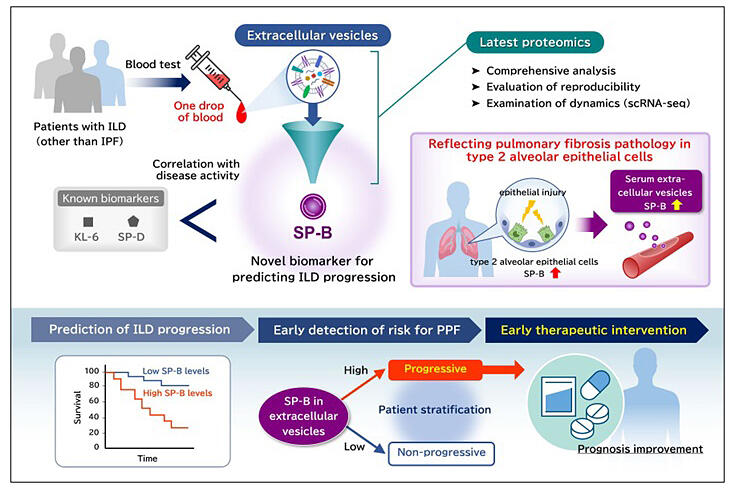A research group led by Graduate Student Takatoshi Enomoto, Assistant Professor Yuya Shirai, Associate Professor Yoshito Takeda, and Professor Atsushi Kumanogoh of the Osaka University Graduate School of Medicine has identified pulmonary surfactant protein B (SP-B) as a novel biomarker useful for predicting the progression of interstitial pneumonia. This biomarker was identified using the latest proteomic and single-cell analyses of extracellular vesicles (exosomes) flowing in the blood. These findings are expected to contribute to early diagnosis and prognostic improvement. The results were published online in the U.S. journal JCI Insight on June 11.

Provided by Osaka University
Interstitial pneumonia is an intractable disease characterized by irreversible pulmonary fibrosis. It is difficult to reverse this state to normal once it occurs, and early therapeutic intervention to control progression is desirable. Furthermore, the speed of progression varies substantially among patients. Due to this, early prediction of progression is difficult, and the development of biomarkers for predicting progression is awaited.
In this study, the research group used the latest proteomics (comprehensive protein analysis) of exosomes, which are attracting attention as a novel class of messengers, to explore a vast number of different proteins from extracellular vesicles in the blood. They successfully identified a biomarker closely associated with the pathophysiology and progression of pulmonary fibrosis for the first time in the world. Exosomes are vesicles secreted by all cells, circulate throughout the body, and transmit information between cells. The research group showed that SP-B correlated more strongly with the stage of interstitial pneumonia than conventional biomarkers and confirmed its ability to detect patients at high risk of having progressive disease at an early stage. Furthermore, SP-B-producing cells were identified using single-cell analysis and other techniques, and SP-B was shown to reflect pulmonary fibrosis in liquid biopsies.
Enomoto said, "Interstitial pneumonia has a poor prognosis comparable to cancer, and although awareness is low, it is the 11th leading cause of death in Japan. It is common for the disease to progress rapidly because of delayed initiation of treatment when the patient is diagnosed to have interstitial pneumonia and a follow-up observation is conducted for the patient. To address the unpredictability of interstitial pneumonia, we hope that the new fibrosis biomarker SP-B, which we discovered, will serve as a guide on when to initiate treatment with antifibrotic drugs and contribute to extending the life expectancy of patients."
Journal Information
Publication: JCI Insight
Title: SFTPB in serum extracellular vesicles as a biomarker of progressive pulmonary fibrosis
DOI: 10.1172/jci.insight.177937
This article has been translated by JST with permission from The Science News Ltd. (https://sci-news.co.jp/). Unauthorized reproduction of the article and photographs is prohibited.




